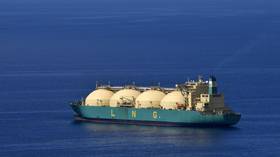US diverts LNG supplies away from China

Tankers loaded with US liquefied natural gas (LNG) that was reportedly destined for China have been diverted to head towards Britain instead, as Europe’s energy crisis worsens by the day.
The cargo is making its way through the UK’s inshore waterways in a move that is “critical to tempering even more extreme prices and demand destruction in Europe,” James Huckstepp, managing analyst at S&P Global Platts said, as quoted by The Telegraph.
“We are seeing cargoes previously destined for Asia now diverting to the UK. This is particularly the case for those cargoes originating in the US, given the journey between the US and Europe is much shorter than that to Asia,” the strategist said.
According to figures reported by Bloomberg, 20 cargo ships with American gas are heading for Europe, with another 14 heading in the general direction of Europe while awaiting final orders. Last weekend, the number of US vessels heading for European ports reportedly increased by a third.
Britain commonly receives most of its gas via pipelines running through the North Sea to Norway and continental Europe, but it also gets around 20% by ship on the global market.
While the mounting supply crunch and record-high prices in Europe have attracted cargo ships away from other parts of the world, the new arrivals are lowering prices.
The TTF Dutch futures contract for delivery in January dropped 1.5% on Tuesday to $1,200 per thousand cubic meters, or €105 ($118,4) per kilowatt hour, marking the fifth consecutive session of declines. Meanwhile, the spot price for gas reached over $2,000 per thousand cubic meters last week.
One of the worst energy crises in recent European history is attributed to a wide range of factors, including low levels of gas storage across the continent and increased energy consumption due to the winter season. The situation is exacerbated by the reluctance by EU countries to buy more gas from Russia amid the growing political rift over Ukraine.
For more stories on economy & finance visit RT's business section













